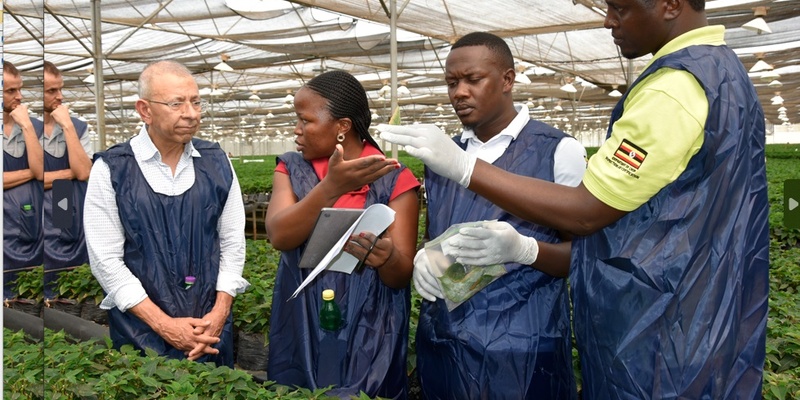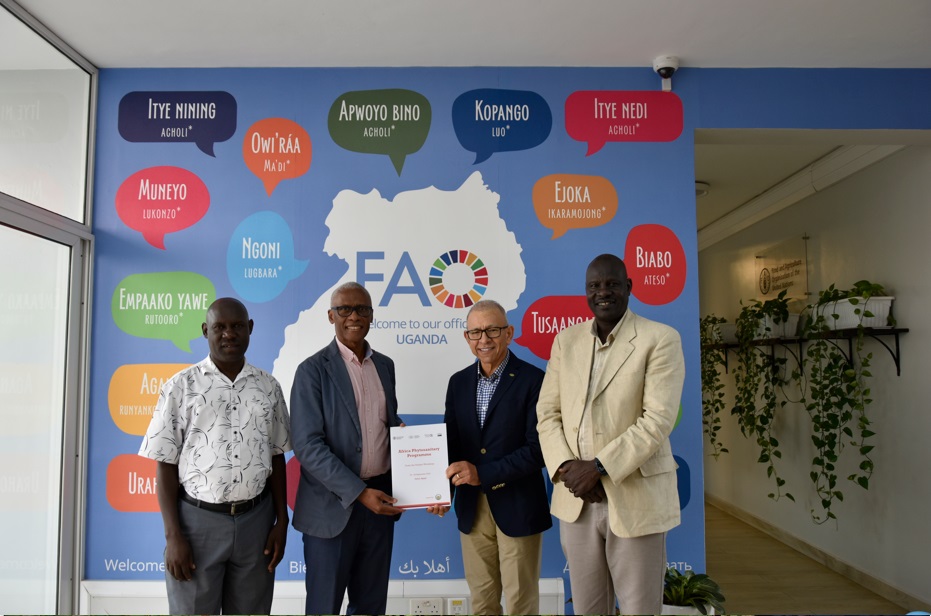Transforming pest surveillance and management in Uganda using science and advanced technology
Posted on Thu, 18 Jul 2024, 07:31

Uganda NPPO staff demonstrate the use of the APP tools for Xylella fastidiosa surveillance in a flower farm / © FAO/Anita Tibasaaga
8 July 2024 Entebbe. The Ministry of Agriculture, Animal Industry and Fisheries (MAAIF) has commended the International Plant Protection Convention (IPPC) for introducing and building a strong and effective Africa Phytosanitary Programme (APP) to transform how African countries monitor, detect, prevent and manage plant pests. Through the Department of Crop Inspection and Certification, the national plant protection organization (NPPO) of Uganda and contact point for IPPC activities, MAAIF has adopted the APP tools among its arsenal against plant pests. These remarks were made at a meeting at the MAAIF headquarters in Entebbe, during the official visit of Osama El-Lissy, IPPC Secretary, to Uganda, one of the 11 countries implementing APP. APP seeks to fortify the capacity of NPPO staff to carry out effective, timely and relevant pest surveillance, detection and diagnosis of plant pests, using science and advanced technology and tools.
Representing Major David Kasura Kyomuhendo, the Permanent Secretary of MAAIF, Ronald Gyagenda Ssegawa, the ministry’s undersecretary highlighted the importance of strengthening national pest surveillance systems to support the implementation of safe trade, early pest detection, and early response to pests.
“Annually, Uganda imports plants and plant products worth over USD 479.2 million and exports more than USD 660 million. Uganda ranks No.45 in terms of food exports to the European Union, worth 480 million Euros. Late detection of pests and untimely response has been costly: costing the country billions of dollars in control and lost foreign exchange revenue due to reduction in exports”, Ssegawa said.
He noted that APP would enhance border control by empowering the newly deployed inspectors and expert working groups on pest surveillance and emergency response to pests. He expressed the ministry’s commitment to “mitigating entry, establishment, and spread of pests of concern to food security and agriculture and natural resources by improving governance structures and capacity of human resources”.
IPPC Secretary El-Lissy congratulated the NPPO for actively implementing APP and working closely with the private sector and other national stakeholders to reduce the impact of pests on agriculture.
“Central to any effective phytosanitary programme is proactive surveillance, identification and diagnostics, all of which APP provides to save crop production and facilitate international and regional trade”, said El-Lissy.
Paul Mwambu, Head of the NPPO, thanked the IPPC for recognizing Uganda’s ePhyto success during the annual meeting of the Commission on Phytosanitary Measures (CPM-18) and International Day of Plant Health in April and May respectively. He underscored APP as a “groundbreaking initiative aimed at bolstering phytosanitary capacity in Africa, where agricultural commodities form the backbone of intra-African trade”.
 |  |
| Ronald Gyagenda Ssegawa (left), Undersecretary in the Ministry of Agriculture, Animal Industry and Fisheries of Uganda, receives materials on APP from Osama El-Lissy (right) IPPC Secretary | Joab Tugume- Phytosanitary Officer at the NPPO of Uganda demonstrates how the APP tool provides data for laboratory diagnostics |
Public-private partnership and APP progress
Since APP’s launch in September 2023, when the IPPC trained six plant health officers per country, the Ugandan trainers have trained 20 inspectors and are carrying out surveys using APP tools for Xylella fastidiosa and Red Palm Weevil, two of Uganda’s prioritized pests. Other key pests are Fusarium Tropical Race 4 (TR4), Bactrocera dorsalis or fruit fly, Banana Bunchy top virus (BBTV), Citrus huanglongbing (HLB) or Citrus greening, Fall armyworm (FAW) and False codling moth. The trained inspectors conducted a major Xylella fastidiosa detection survey in five flower farms in November 2023, with all 142 samples representing 18 plant species testing negative.
Uganda has provided the IPPC Secretariat with an operational plan for further in-country training and APP implementation, including surveillance of BBTV and TR4, which are threatening banana production in the country.
The NPPO of Uganda is working closely with the private sector to monitor priority pests and facilitate safe trade, including using the IPPC ePhyto Solution. This was demonstrated during a visit to a private farm, where the NPPO carries out pest surveys on horticultural crops. Data collected from APP surveys will be critical in providing evidence of pest-free production areas from which agriculture exports are generated. To make trade even safer and more efficient, the NPPO is promoting the use of the IPPC ePhyto Solution to reduce delays and fraud through the digitalization of phytosanitary certificates.
During the visit, El-Lissy interacted with the management of private horticultural farms and the association of horticultural producers and exporters in Uganda. They expressed their enthusiasm about APP and its potential to transform pest management in Uganda and Africa.
FAO backs APP implementation in Uganda
The IPPC is implementing APP in collaboration with the Food and Agriculture Organization of the United Nations (FAO) and the African Union Department of Agriculture, with funding from the United States Department of Agriculture (USDA). El-Lissy also met Antonio Querido, the FAO Representative in Uganda and Martin Ameu, Programme Associate and APP focal person at FAO Uganda.

(L-R) Martin Ameu, Programme Associate, Antonio Querido, FAO Representative in Uganda, Osama El-Lissy, IPPC Secretary and Arop Deng, Integration and Support Team Leader at the IPPC Secretariat

